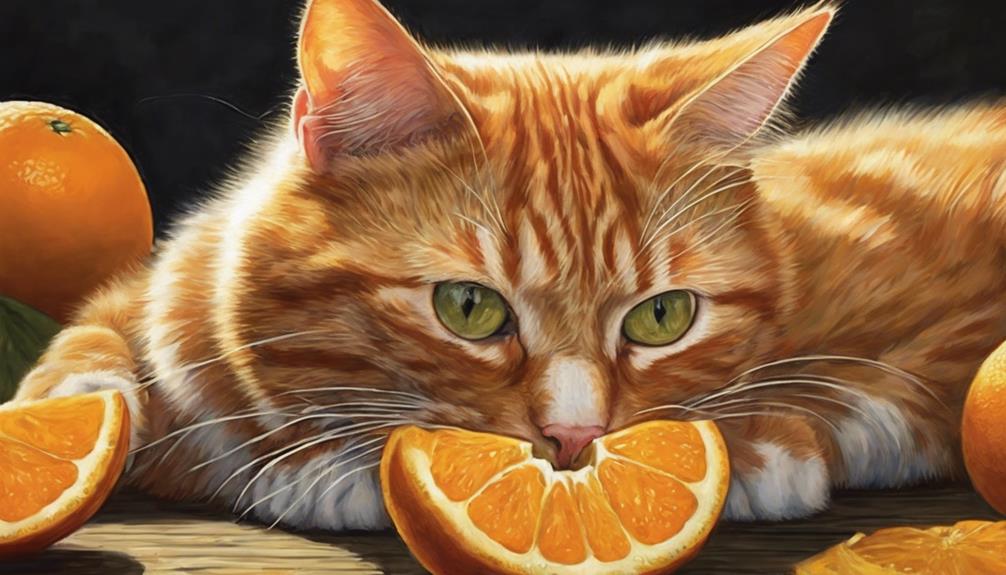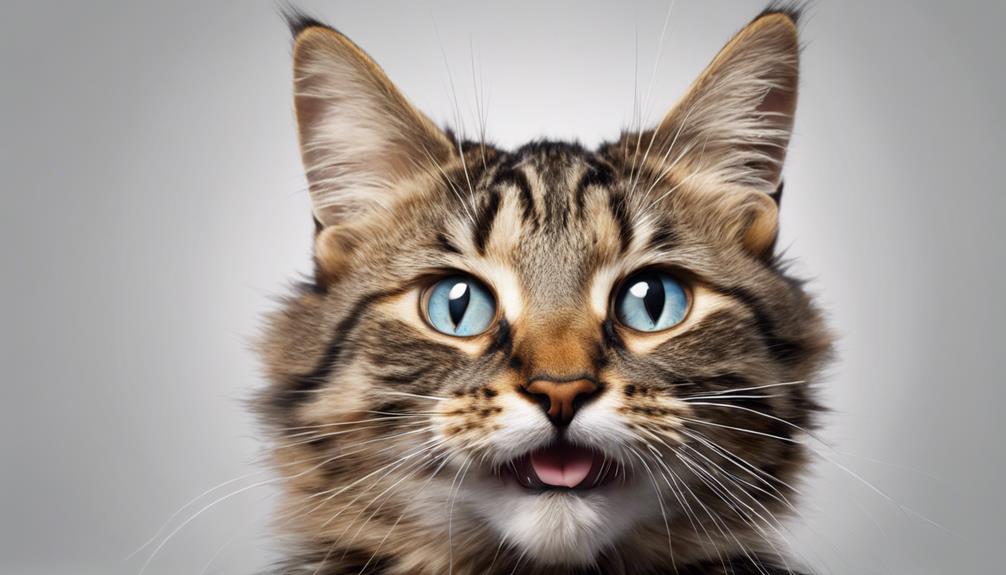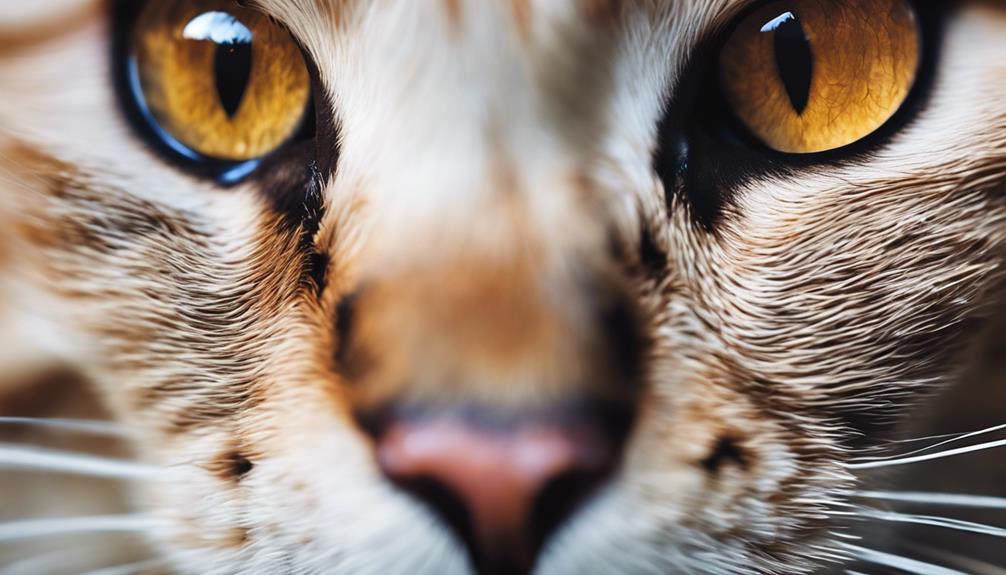Oranges can be harmful to cats. Essential oils, citric acid, psoralens, and furocoumarins found in all parts of the fruit can pose health risks for felines. Ingestion may lead to vomiting, diarrhea, weakness, and more serious issues such as neurological problems. Even the peel, seeds, and leaves are toxic. Cats may display symptoms of citrus sensitivity, making orange consumption risky. If your cat exhibits signs of citrus toxicity or has ingested oranges, immediate veterinary care is necessary. It is crucial to keep oranges out of reach of cats for their well-being. For more information on safe treats and dietary options, continue exploring.
Key Takeaways
- Oranges are toxic to cats due to harmful components like essential oils and citric acid.
- Ingesting oranges can cause vomiting, diarrhea, muscle tremors, weakness, and stomach upset in cats.
- All parts of an orange, including the peel, seeds, and leaves, are harmful to cats.
- Cats should not have oranges due to the risk of severe symptoms like neurological problems and allergic dermatitis.
- Immediate veterinary care is crucial if a cat ingests any part of an orange.
Oranges Are Toxic to Cats
Oranges pose a significant danger to cats due to their toxic components, which can cause various adverse reactions upon ingestion. Cats are curious creatures, and their exploration might lead them to oranges. However, it's important to understand that oranges and any citrus fruits contain substances that are toxic to our feline friends.
The essential oils, citric acid, psoralens, and furocoumarins found in oranges can wreak havoc on a cat's system if ingested. From the peel to the seeds and even the leaves, all parts of an orange can be harmful to cats. If a cat consumes oranges, they may experience unpleasant symptoms like vomiting, diarrhea, drooling, weakness, and even photosensitivity. These reactions can escalate to more severe issues such as neurological problems and allergic dermatitis.
To safeguard the well-being of our beloved cats, it's important to keep oranges and other citrus fruits far from their reach to prevent accidental ingestion and potential poisoning.
Harmful Components in Oranges
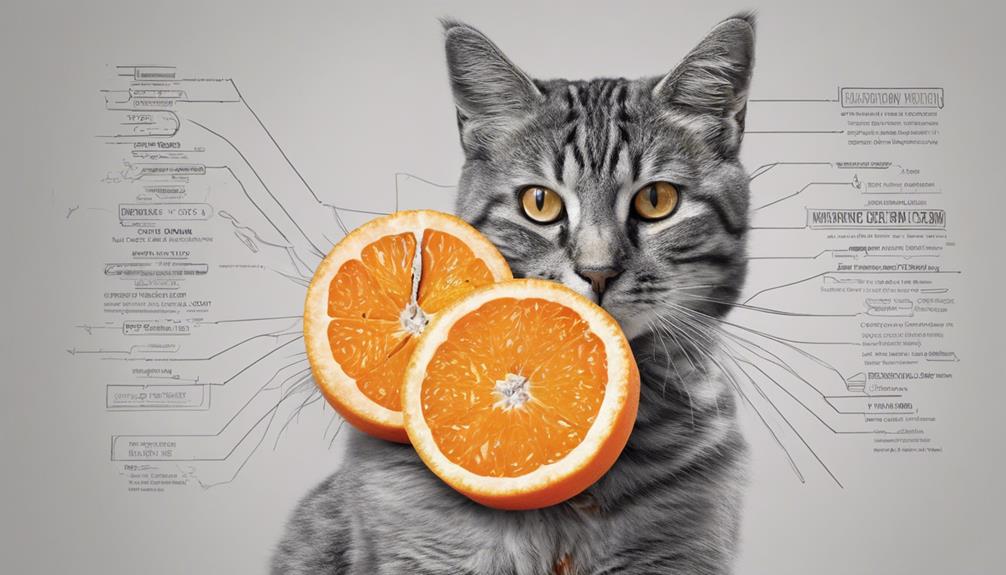
Oranges contain harmful components for cats.
Citrus oils are toxic and the high acidity causes issues, upsetting cats' stomachs.
It's crucial to keep oranges away from our feline friends to prevent any potential health problems.
Citrus Oils Are Toxic
After consuming citrus oils from oranges, cats may experience harmful effects on their nervous system. These oils contain compounds that can be toxic to our feline companions. To illustrate the dangers of citrus oils for cats, let's look at a comparison between the effects on humans versus cats:
| Effects | Humans | Cats |
|---|---|---|
| Ingestion | Generally safe | Toxic |
| Skin exposure | Mild irritation | Toxic |
| Aromatherapy | Therapeutic benefits | Toxic |
It's important to remember that what may be safe for us can be harmful to our furry friends. Hence, it's best to keep oranges and any citrus fruits away from cats to prevent any potential toxicity from citrus oils.
High Acidity Causes Issues
Essential acidity in oranges poses a risk to cats, leading to potential digestive issues and upset stomach due to their sensitivity to these harmful components. Cats' delicate digestive systems struggle to handle the acidity levels found in oranges, which can result in discomfort and health problems.
These acidic properties can irritate the stomach lining of cats, causing vomiting or diarrhea. Additionally, the high acidity in oranges may disrupt the natural pH balance in a cat's digestive tract, further exacerbating these issues.
It's essential to be cautious and avoid exposing your feline friends to foods like oranges that contain such high acidity levels, as it can have adverse effects on their well-being.
Upsets Cats Stomach
When cats ingest oranges, the important components present, such as citric acid and essential oils, can disrupt their stomach and lead to various digestive issues. These components can upset a cat's stomach, causing symptoms like vomiting, diarrhea, and stomach distress.
The sugar and acids in oranges may not sit well with your feline friend, potentially leading to discomfort and health issues. Essential oils found in oranges can even affect a cat's nervous system, compounding the problems.
It's vital to be mindful of what your cat consumes to avoid any unnecessary stomach upsets or adverse reactions. Keeping oranges away from your cat can help maintain their digestive health and overall well-being. Remember, a happy cat starts with a healthy stomach.
Citrus Sensitivity in Cats
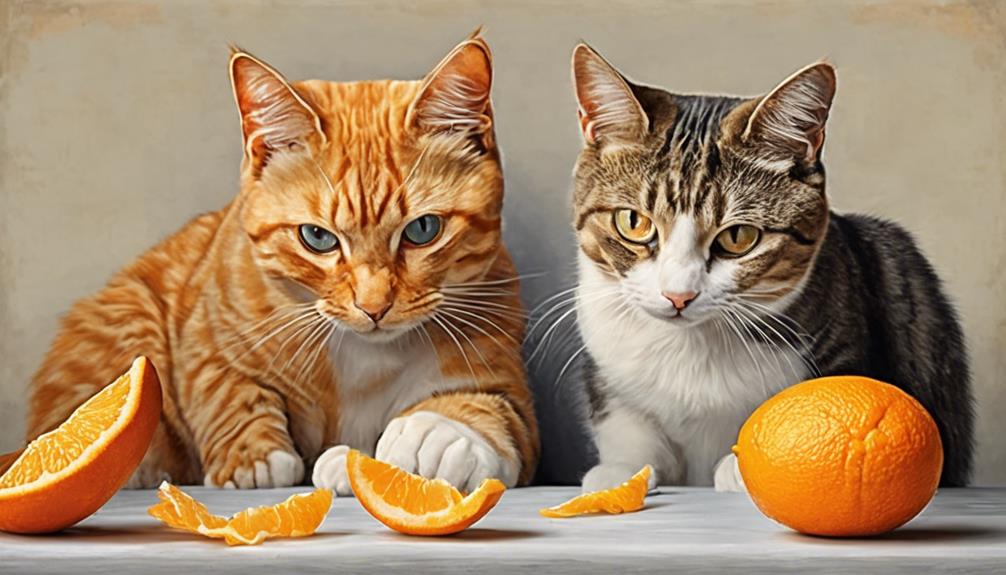
When considering cats and citrus, it's crucial to be aware of the risks oranges pose to our feline friends. Oranges contain harmful compounds that can lead to symptoms like vomiting, diarrhea, and drooling in cats.
Knowing the signs of citrus toxicity and being cautious with citrus fruits around cats can help keep our pets safe and healthy.
Cats and Citrus
Noticing their strong aversion to citrus fruits, cat owners must be aware of the potential risks associated with cats and oranges due to their toxicity. Oranges contain essential oils, citric acid, psoralens, and furocoumarins, all of which can be harmful to our feline friends. Even the peels, seeds, and leaves of oranges pose a danger to cats, causing symptoms like vomiting, diarrhea, muscle tremors, weakness, and photosensitivity.
Cats instinctively avoid citrus fruits because of their intense smell and taste, acting as a natural defense mechanism. If a cat ingests any part of an orange, immediate veterinary attention is crucial to prevent severe health issues. Remember, keeping oranges away from your curious kitty is the best way to ensure their well-being.
Risks of Oranges
Given the essential toxicity of oranges to cats due to compounds like essential oils and citric acid, it's vital for cat owners to understand the risks associated with citrus sensitivity in felines. Oranges contain toxic compounds such as psoralens and furocoumarins, which can trigger adverse reactions in cats. These reactions may manifest as vomiting, diarrhea, muscle tremors, weakness, and stomach pain.
Surprisingly, orange peels, seeds, and leaves harbor higher levels of these harmful substances compared to the fruit itself, intensifying the danger for our feline friends. Additionally, cats can experience photosensitivity after ingesting oranges, making it crucial to prevent their access to citrus fruits.
Symptoms to Watch
Symptoms of citrus sensitivity in cats commonly manifest as stomach distress, vomiting, diarrhea, and drooling. When observing your feline friend for signs of citrus sensitivity, keep a close eye on the following symptoms:
- Lethargy: If your cat seems unusually tired or lacks energy, it could be a sign of citrus-related issues.
- Behavioral changes: Watch for any sudden shifts in your cat's behavior, such as increased irritability or withdrawal.
- Skin reactions: Check for any skin redness, itchiness, or swelling, as these could indicate an allergic reaction.
Monitoring your cat for these symptoms can help you catch any potential issues early on and seek prompt veterinary care if needed. Remember, your cat's well-being is always a top priority!
Symptoms of Citrus Toxicity
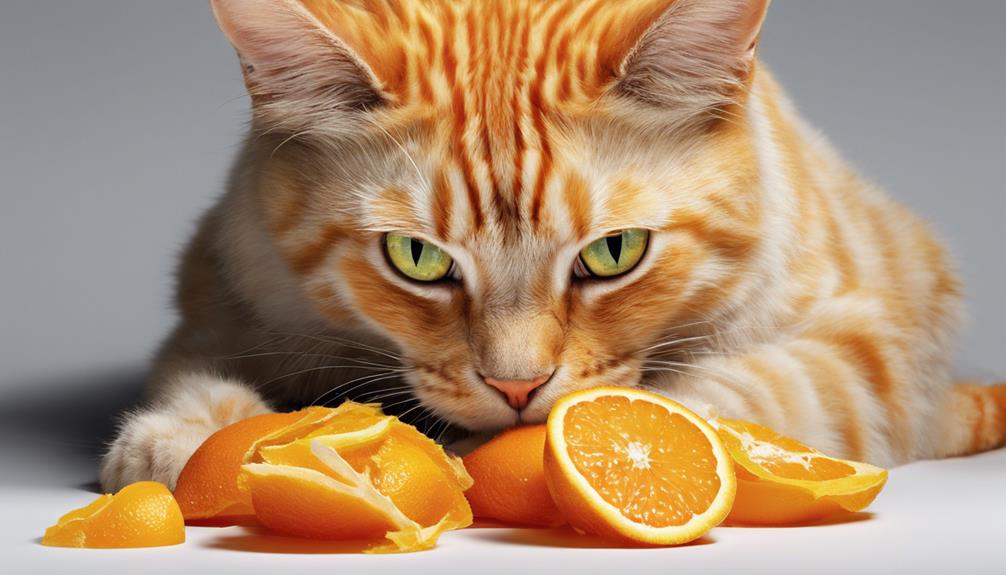
Experiencing stomach distress like vomiting and diarrhea is a common indicator of citrus toxicity in cats. If your feline friend starts drooling excessively or shows signs of weakness and depression after ingesting oranges, these could be symptoms of citrus poisoning.
In severe cases, citrus toxicity can even lead to nervous system issues in cats, making it imperative to monitor your pet's behavior closely if they've had any contact with citrus fruits. Another concerning symptom is photosensitivity, where cats become more sensitive to light after consuming oranges. This reaction indicates a potential toxicity that shouldn't be ignored.
If you notice any of these symptoms in your cat, veterinary care is necessary immediately. Remember, prevention is key, so keep oranges and other citrus fruits out of your cat's reach to avoid any potential health risks.
Repellent Nature of Oranges
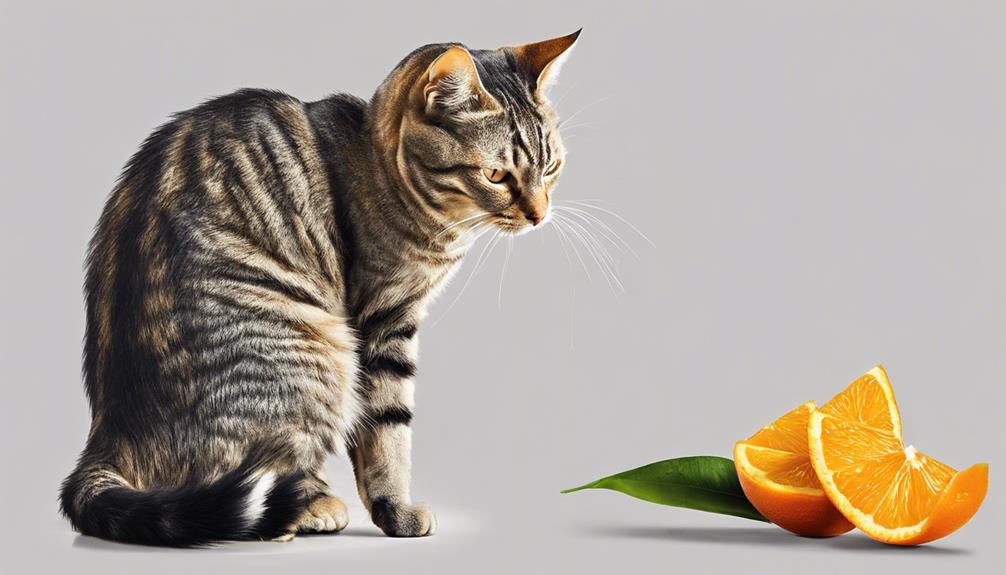
The natural repelling effect of oranges on most cats is due to their strong citrusy scent. Cats contain a highly sensitive sense of smell, and the intense aroma of citrus fruits like oranges can be overwhelming for them. This aversion to oranges is an instinctual response that helps protect cats from potential harm.
- Cats instinctively avoid citrus scents due to their sensitivity.
- Oranges emit a strong smell that cats find off-putting.
- The repellant nature of oranges for cats is a built-in protective mechanism.
Understanding why cats tend to steer clear of oranges can help pet owners ensure their feline friends stay safe and healthy. By recognizing and respecting cats' natural instincts to avoid citrus fruits, we can help prevent any unwanted incidents. It's crucial to provide a cat-friendly environment that aligns with their natural behaviors and preferences, including steering clear of foods like oranges that may not sit well with them.
Vomiting and Diarrhea in Cats

When cats ingest oranges, they may experience digestive issues such as vomiting and diarrhea.
The toxic components in oranges, like essential oils and acids, can irritate a cat's stomach, leading to these unpleasant symptoms.
If your cat shows signs of vomiting and diarrhea after consuming oranges, it's important to seek immediate veterinary care for proper management.
Digestive Issues in Cats
In some situations, cats can develop digestive issues, particularly vomiting and diarrhea, when exposed to oranges due to their high sugar and acidic content.
- Cats may show signs of stomach distress, including vomiting and diarrhea, if they consume oranges or citrus oils.
- Citrus poisoning from oranges can lead to gastrointestinal upset in cats, resulting in symptoms like vomiting and diarrhea.
- Orange peels, seeds, and leaves contain harmful compounds that can irritate a cat's digestive system, potentially causing vomiting and diarrhea.
If your feline friend experiences any digestive problems after ingesting oranges, it's important to seek veterinary care promptly for a proper diagnosis and appropriate treatment. Your cat's well-being is our top priority.
Causes of Vomiting
Experiencing vomiting and diarrhea in cats can stem from various factors, including dietary indiscretion, infections, parasites, or underlying health conditions. When our feline friends start vomiting, it can be a sign that something isn't quite right. To help you understand better, let's take a look at some common causes of vomiting in cats:
| Causes of Vomiting | Description |
|---|---|
| Dietary Indiscretion | Eating something they shouldn't |
| Infections | Viral or bacterial illnesses |
| Parasites | Worms or other infestations |
| Health Conditions | Kidney disease or pancreatitis |
These factors can lead to your cat feeling under the weather, so it's crucial to monitor their symptoms and seek veterinary advice if needed.
Managing Diarrhea in Cats
To effectively manage diarrhea in cats, it's important to closely monitor their symptoms and provide adequate hydration. When dealing with diarrhea in your feline friend, keep these tips in mind:
- Evaluate Their Diet: Check if recent changes in their cat food might be causing digestive upset.
- Offer Bland Food: Consider feeding your cat a bland diet like boiled chicken and rice to help soothe their stomach.
- Consult a Vet: If the diarrhea persists or is accompanied by other concerning symptoms, seek guidance from a veterinarian specializing in feline health.
Muscle Tremors in Cats
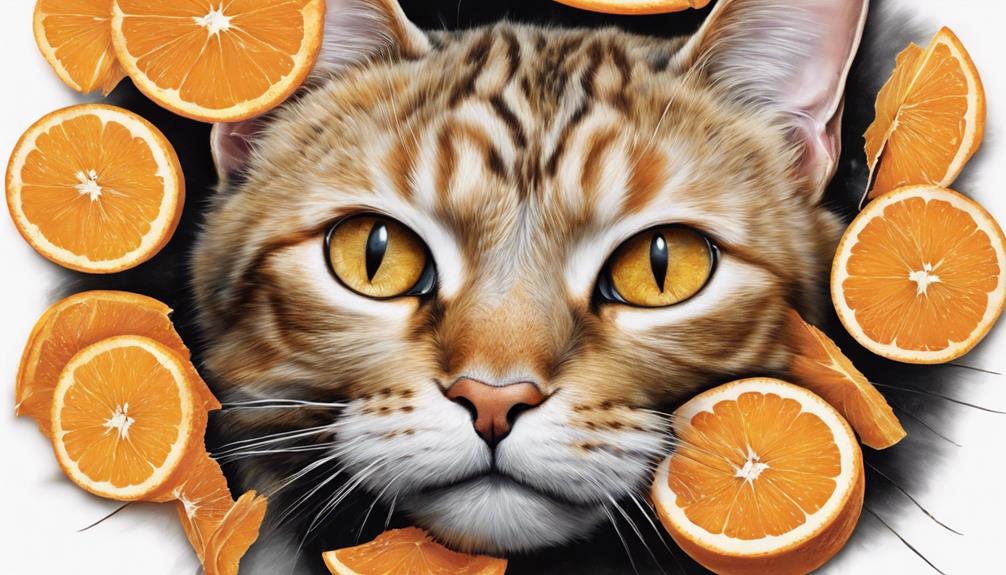
When cats display muscle tremors, it can be a clear indication of citrus toxicity resulting from consuming oranges. These involuntary muscle movements or shaking are signs of a serious toxic reaction that can stem from citrus poisoning. Cats may experience neurological issues, including muscle tremors, after ingesting oranges. It's critical to recognize that muscle tremors in cats indicate a harmful response to oranges and shouldn't be taken lightly.
If you notice your feline friend exhibiting muscle tremors, especially after consuming oranges, seeking immediate veterinary attention is imperative. Citrus toxicity can have severe consequences on your cat's health, and prompt intervention is necessary to address the situation effectively. Remember, muscle tremors are a red flag signaling potential citrus poisoning, and professional help is crucial in ensuring the well-being of your beloved pet. Keep a close eye on your cat's behavior and act promptly if you observe any concerning symptoms like muscle tremors.
Immediate Vet Contact Necessary

If your cat consumes oranges, immediate vet contact is essential as citrus can be toxic to felines. Symptoms to watch for include vomiting, diarrhea, weakness, and stomach pain.
Contact your veterinarian promptly if you notice any signs of citrus poisoning in your cat.
Cats and Citrus Sensitivity
Citrus sensitivity in cats can trigger severe symptoms like vomiting, diarrhea, and drooling, necessitating immediate veterinary attention. Cats are sensitive to essential oils and citric acid found in oranges, which can harm their digestive systems. When cats eat oranges, it can lead to weakness, stomach pain, and even photosensitivity.
Here are some important points to remember about cats and citrus sensitivity:
- Oranges can cause vomiting, diarrhea, and drooling in cats.
- Essential oils and citric acid in oranges may be harmful to cats' digestive systems.
- Immediate veterinary care is essential if a cat ingests oranges due to potential toxicity.
Signs of Toxicity
Recognizing the signs of citrus toxicity in cats is essential for prompt veterinary intervention. If your feline friend has ingested orange peel, watch for symptoms like vomiting, diarrhea, and drooling. Additionally, your cat may show signs of weakness, stomach pain, and increased sensitivity to light after consuming oranges. Immediate contact with your vet is critical if any of these indicators are present to guarantee your cat receives the necessary care. To help you recognize these symptoms better, here is a table outlining common signs of citrus toxicity in cats:
| Symptom | Description | Action |
|---|---|---|
| Vomiting | Expelling stomach contents | Contact vet immediately |
| Diarrhea | Loose or watery stool | Seek veterinary assistance |
| Drooling | Excessive saliva production | Immediate veterinary visit |
| Weakness | Lack of strength or energy | Urgent vet consultation |
Treatment Options
Upon suspecting citrus toxicity in cats, immediate veterinary contact is imperative for appropriate treatment options. When facing this situation, remember the following:
- Professional Evaluation: A veterinarian will assess the cat's condition and provide necessary treatment based on the severity of symptoms.
- Fluid Therapy: Intravenous fluids may be administered to help flush out the toxins and support the cat's hydration.
- Monitoring and Support: Continuous monitoring is essential to guarantee the cat's condition stabilizes, with additional supportive care as needed.
Avoiding Other Harmful Fruits

What other fruits should we avoid feeding to cats to prevent potential toxicity and health issues? Grapes, cherries, plums, and tomatoes are among the toxic fruits that can be harmful to our feline friends. These fruits have been linked to various health problems in cats, such as kidney failure, gastrointestinal upset, and respiratory issues.
Compounds like solanine in tomatoes and cyanide in cherries can pose serious risks to our cats' well-being. Even small amounts of grapes and raisins can lead to kidney failure in cats, making it imperative to steer clear of these fruits altogether.
To safeguard the safety and health of our beloved pets, it's crucial to be vigilant and avoid feeding them any fruits that could potentially be toxic. Researching and understanding which fruits are harmful to cats can help us make informed decisions when it comes to their diet, ultimately protecting them from unnecessary health risks.
Vitamins C and Cats
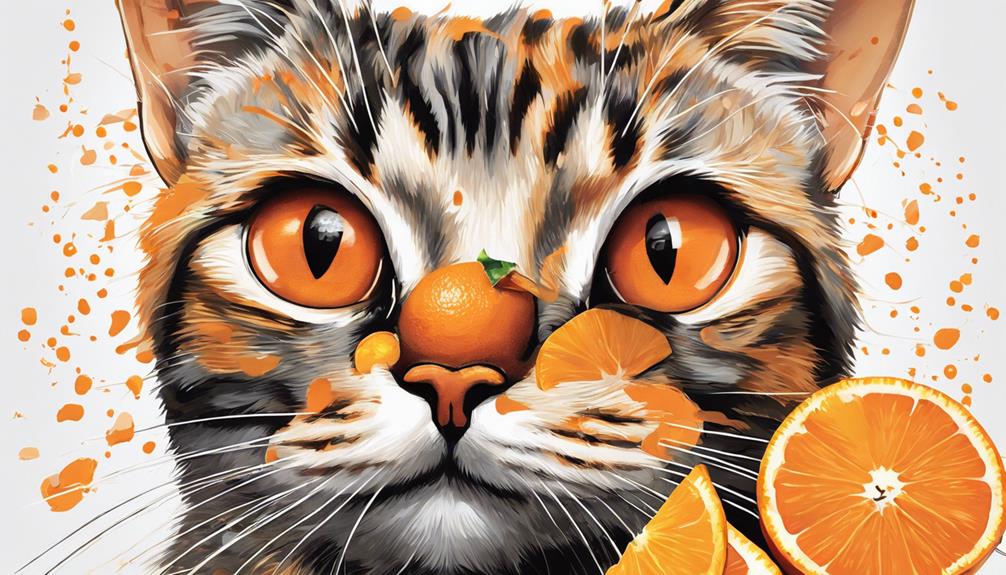
Discussing the importance of vitamin C for cats, it's essential to understand that they don't rely on oranges for this nutrient. Cats have the ability to produce their own vitamin C, so they don't need to consume it from fruits like oranges.
- Cats are self-sufficient: Unlike humans, cats can synthesize their own vitamin C, meeting their needs through their diet.
- Balanced diets: Providing cats with a well-rounded diet guarantees they receive all the essential nutrients they require, including vitamin C.
- Health considerations: While oranges are a good source of vitamin C for humans, they aren't necessary for feline health due to their unique ability to produce this vitamin internally.
Understanding your cat's nutritional requirements is critical for their well-being. By focusing on a complete and balanced diet designed for feline needs, you can make sure that your cat receives all the necessary vitamins, including vitamin C, without the need for oranges or other potentially harmful fruits.
Safety of Oranges for Cats
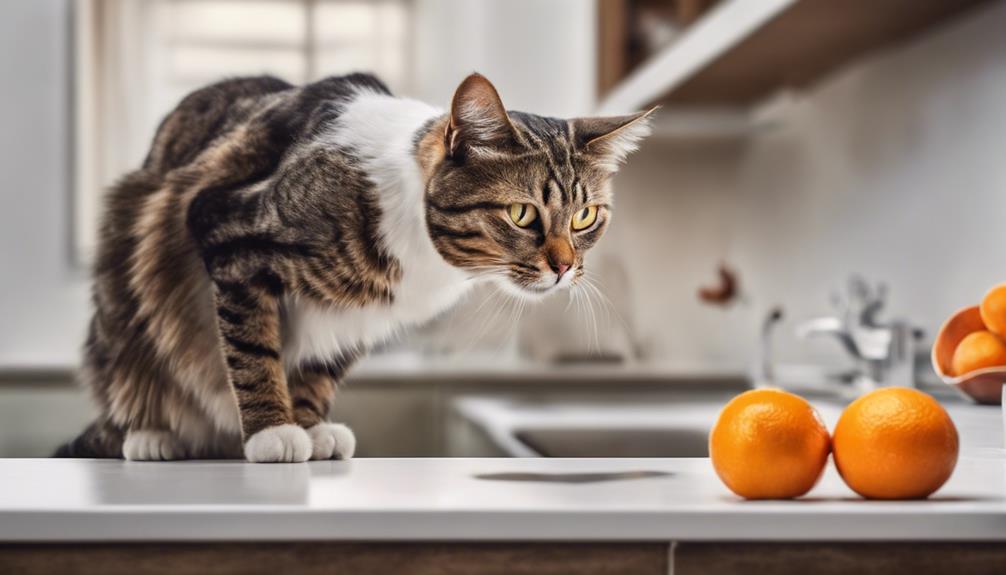
Oranges pose a significant risk to cats due to their toxic components like essential oils and citric acid. Pet parents, it's important to keep oranges away from your feline friends as all parts of the fruit, including peels, seeds, and leaves, can be harmful to them.
While cats typically avoid citrus fruits like oranges because of their strong scent, accidental ingestion can lead to symptoms such as vomiting, diarrhea, weakness, and even photosensitivity in our beloved pets.
If you suspect that your cat has ingested any part of an orange, immediate veterinary attention is necessary to prevent severe health issues. Remember, it's always better to be cautious than sorry when it comes to our furry companions' well-being.
Keep oranges out of reach and opt for cat-friendly treats to guarantee a happy and healthy life for your precious furball.
Signs of Orange Ingestion
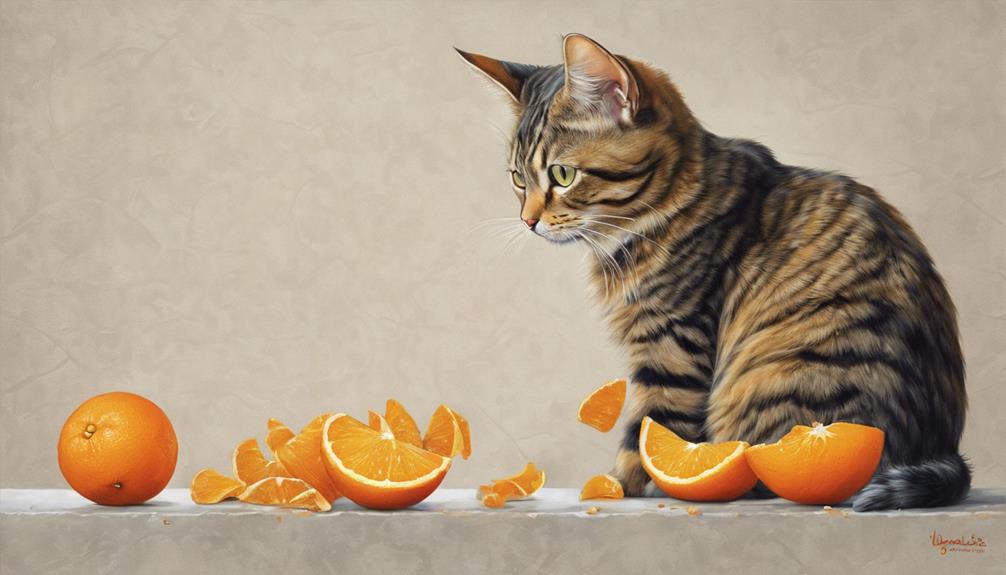
After highlighting the risks associated with oranges for cats, it's vital to recognize the signs of orange ingestion in feline companions. When a cat has eaten oranges, it's essential to be vigilant for any unusual behaviors or symptoms that may indicate they're experiencing issues due to this fruit.
Here are some signs to watch out for:
- Stomach Distress: Keep an eye out for any signs of stomach upset such as vomiting or diarrhea after your cat has eaten oranges.
- Weakness and Depression: If your feline friend seems unusually weak or depressed after consuming oranges, it could be a red flag.
- Excessive Drooling: Excessive drooling can be a sign of oral irritation or other problems that may arise from orange ingestion.
Opt for Healthier Cat Treats
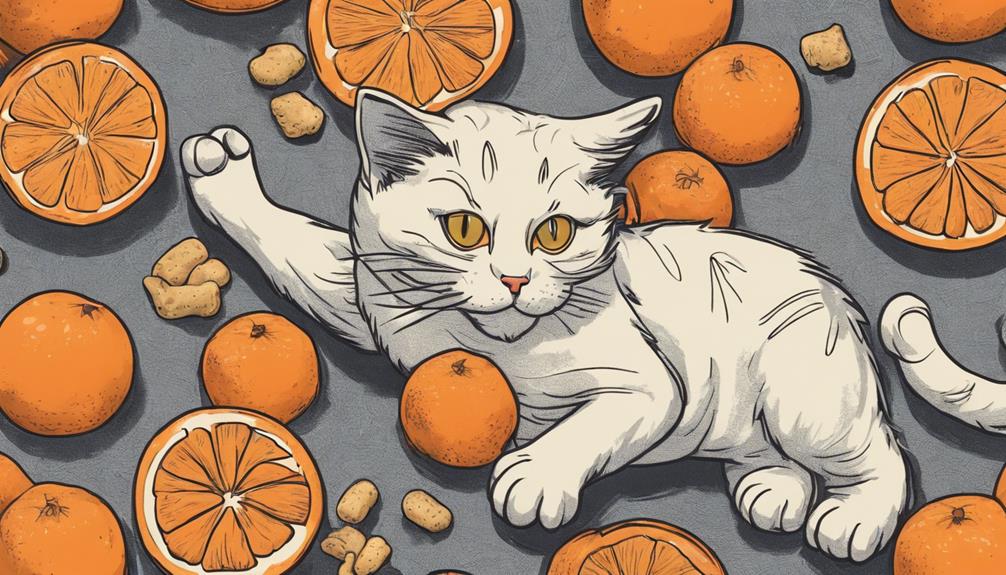
When selecting treats for your cat, prioritize options that guarantee their overall health and well-being. Opt for healthier cat treats that are specifically made for feline friends to make sure they're safe and nutritious. Safe fruit choices like blueberries, strawberries, bananas, apples, and melons can be excellent alternatives to traditional store-bought treats. Remember to remove any stems, leaves, cores, or seeds from fruits before offering them to your cat to prevent choking hazards.
It's essential to keep treats to only 10% of your cat's daily caloric intake to maintain a balanced diet and prevent weight issues. Before introducing new foods, especially to cats with health conditions like diabetes, consult with a veterinarian to guarantee it's safe and appropriate for your furry companion. By paying attention to the treats you offer your cat, you can contribute to their overall well-being and show them love through mindful pet care choices.
Consulting a Veterinarian
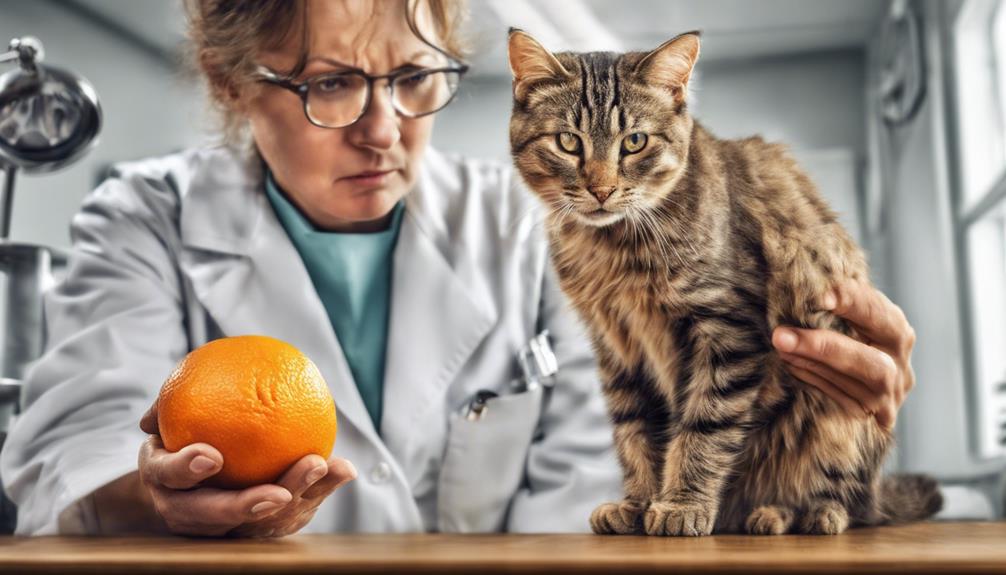
Seeking guidance from a veterinarian before introducing new foods to your cat's diet is vital for ensuring their well-being and safety. Vets can provide expert advice on whether cats can safely consume oranges. Consulting a veterinarian is essential as they can offer guidance on the potential risks and effects of oranges on a cat's health.
Additionally, a veterinarian can recommend safe alternatives to oranges for cat treats, ensuring that your feline friend enjoys tasty snacks without compromising their health. By seeking veterinary input, you're taking proactive steps to guarantee the well-being and safety of your beloved pet.
Citrus-Free Diet for Cats
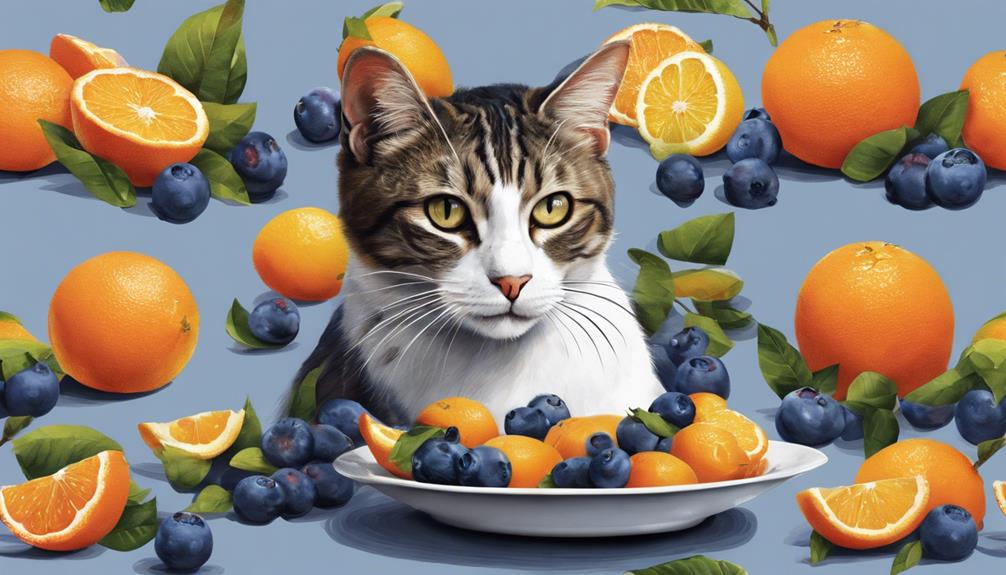
Before introducing any new foods to our cat's diet, it's essential to understand the importance of maintaining a citrus-free diet for their well-being. Oranges contain essential oils, citric acid, psoralens, and furocoumarins, all of which can be toxic to our feline friends. Even the peel, seeds, and leaves of oranges can be harmful if ingested by cats.
Symptoms of citrus toxicity may include vomiting, diarrhea, drooling, weakness, and photosensitivity. While most cats naturally avoid citrus fruits due to their strong smell and taste, it's vital to keep oranges out of reach to prevent accidental ingestion and potential poisoning.
Frequently Asked Questions
What Happens if My Cat Eats an Orange?
If my cat eats an orange, it can lead to stomach issues, vomiting, and more serious problems like nervous system issues or allergic reactions. The peel is especially dangerous. If symptoms arise, contacting a vet is essential.
Are Any Fruits Toxic to Cats?
Yes, some fruits are harmful to cats. It's important to avoid feeding cats toxic fruits like grapes, raisins, onions, garlic, and citrus fruits. These can lead to serious health issues and should be kept away from cats.
Is It Normal for a Cat to Like Oranges?
It's unusual for a cat to enjoy oranges. Their sensitive noses tend to dislike the citrus scent. While some cats might be curious, most will likely steer clear due to the strong smell.
Do Cats Like the Taste of Orange?
We, cats, generally dislike the taste of oranges due to their strong scent and bitter flavor. Our sensitive noses and natural instincts guide us away from citrus fruits. Oranges are not our preferred snack.
Is it Safe for Cats to Eat Fruits with High Water Content?
While cats eating melon safety guide may suggest that fruits with high water content are safe, it’s important to be cautious. Some fruits like melon can be consumed in moderation, but others like grapes and raisins can be toxic to cats. Always consult your vet before introducing new foods to your pet’s diet.
Conclusion
To wrap up, it's important to bear in mind that oranges are toxic to cats and should be avoided in their diet. Just a small amount of orange can cause harm to your feline friend. Remember, when it comes to treating your cat, opt for healthier options like cat-friendly treats.
Did you know that nearly 50% of cats may experience citrus sensitivity? It's always best to consult with your veterinarian to make sure your cat's diet is safe and healthy.
